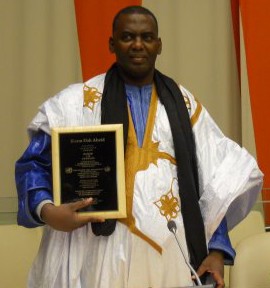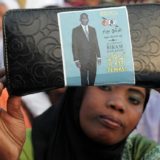Irwin Cotler and Judith Abitan: Mauritania abolished slavery in 1991, so why is it criminalizing slavery opponents?
The painful truth is that the country has not abolished slavery, but rather remains its last stronghold

Although Mauritania claims that it has abolished slavery, it actually remains one of the world’s only bastions of slavery. Biram Dah Abeid is the leader of the international anti-slavery movement and president of the Initiative for the Resurgence of the Abolitionist Movement in Mauritania (IRA-Mauritania).
Biram, a former Mauritanian political prisoner subjected to repeated arrests — listed by Time Magazine as one of the 100 most important people in the world — is one of the great human rights heroes of our time, and the recipient of many international awards for his courageous advocacy.
As one of Biram’s international legal counsel, we welcomed him to Montreal to join us as a guest speaker on the occasion of our celebration of the 375th anniversary of Montreal as a “Rights City” in May 2017. Biram had recently been released from yet another round of imprisonment for his anti-slavery work, and during his visit to Canada, also appeared as an expert witness before the Canadian Parliamentary Subcommittee on International Human Rights to share compelling testimony on the deteriorating situation in Mauritania.

As we write, Biram has once again become a political prisoner with his arrest last month on the eve of registration for parliamentary elections where he was slated to be an opposition candidate. This latest arrest, however offensive, did not result from his anti-slavery activity. Indeed, as the arresting officers advised him — and as Biram reported to us — the authorities acknowledged that “this arrest is not the result of your political views, or your human rights work, as in previous arrests.”
As it happens, this latest arrest follows the pattern of illegalities and indignities of previous imprisonments, including: arbitrary and illegal arrest without a warrant; torture in detention; denial of the right to counsel; denial of a right to a fair hearing; and trumped-up charges of “voluntary assault,” where his lawyer has been denied access to the police report and the allegedly incriminating prosecutorial evidence.
This latest imprisonment on an “order from above,” as Biram was told, appears intended not only to silence him — and criminalize his freedom of expression — but to prohibit Biram’s participation in the upcoming elections. It is of a piece also with the wave of pre-election arrests of other IRA anti-slavery activists, opposition candidates, and journalists arrested on the same time as Biram.
Simply put, this is not only an assault on the anti-slavery movement, freedom of speech, and the rule of law, though that would be bad enough. It is an assault on the democratic order itself in Mauritania, and on any pretence of democracy; yet this standing assault has been met with hardly any condemnation — let alone outrage — from the international community.

It may well be because many in the international community have bought into Mauritania’s narrative that it actually abolished slavery in 1991, from when its Constitution stipulates that, “No one shall be reduced to slavery or to any form of servitude (asservissement) of the human being, or submitted to torture and other cruel, inhuman or degrading treatments … ” It even recognizes that such practices constitute “crimes against humanity.” The painful truth is that Mauritania has not so much abolished slavery as that it remains the last stronghold of slavery. Indeed, as a State Party to the International Convention on the Elimination of All Forms of Racial Discrimination — yet another framing ruse by Mauritania — it is in standing violation of its international legal obligations.
Mauritania is not only criminalizing the opponents of slavery, it is even preventing them from exercising any of their fundamental rights, including that of participating in elections. In short, it is a repository of both slavery and tyranny, and deserves the opprobrium and shaming of the international community. A first step in exposing and unmasking Mauritanian duplicity and criminality must be the immediate freeing of Biram and permitting him to be a candidate in the elections.
Irwin Cotler is the chair of the Raoul Wallenberg Centre for Human Rights and former minister of justice and attorney-general of Canada. He has been acting as one of Biram Dah Abeid’s international legal counsel. Judith Abitan is the executive director of the Raoul Wallenberg Centre for Human Rights, which has adopted Biram Dah Abeid’s case and cause as part of its International Political Prisoner Advocacy Project.


